Those exploring reverse mortgages may have specific questions or concerns or need more information about concepts presented elsewhere in this guide. This very important question (VIQ) section provides clear answers to frequently asked questions (FAQs).

Reverse mortgage FAQs
- Are reverse mortgages safe?
- What does "federally insured" reverse mortgage or HECM mean?
- Do I still need to pay property taxes with a reverse mortgage?
- Can an HECM disturb other benefits I receive?
- Can I cancel my reverse mortgage?
- Is it possible to pay off my HECM or reverse mortgage loan?
- What happens if I become incapacitated?
- What happens if I move or live in my home part-time?
- What happens when the home is vacated by the last eligible resident?
- What happens if I use all my equity?
- Can I end up owing any money to the reverse mortgage lender?
- What annual certification do HECMs require?
Click through on the items of interest to you or scroll down to review all answers to very important questions about reverse mortgages and HECMs.
Are reverse mortgages safe?
After a rough and rocky early history, the market for reverse mortgages (RMs) and home equity conversion mortgages (HECMs) has matured well. Most of the market has fallen in line with HUD's guidelines for HECMs, where precautions and safety nets have been added over time. For example, new rules prevent Grandma from getting thrown out of the home after Grandpa dies, while life-expectance set-asides ensure help that taxes and fees are paid.
In the past, reverse mortgages and HECMs suffered from a variety of consumer-unfriendly ills. For example, the fees and charges to obtain one were very high, draining a considerable chunk of a borrower's equity. At times, borrowers were encouraged to take all available equity at once, which in turn raised the total interest cost of the loan, since interest was being charged on the maximum amount from day one.
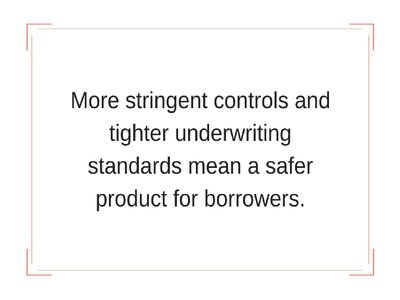 In some cases, borrowers emptied all of the equity in their homes, and didn't have the financial wherewithal to make needed repairs, cover required insurances or pay property taxes. This led to all manner of legal issues for both borrower and lender, including evictions, foreclosures and more. Until recently, the issue of a spouse who lived in the home but was not on the mortgage or deed was a thorny one, leading to some difficult situations when the mortgage holder could no longer live in the home or passed away.
In some cases, borrowers emptied all of the equity in their homes, and didn't have the financial wherewithal to make needed repairs, cover required insurances or pay property taxes. This led to all manner of legal issues for both borrower and lender, including evictions, foreclosures and more. Until recently, the issue of a spouse who lived in the home but was not on the mortgage or deed was a thorny one, leading to some difficult situations when the mortgage holder could no longer live in the home or passed away.
Due to these issues, many private reverse mortgage lenders stopped making these products available.
Today's HECMs and RMs are considerably more rigid than their freewheeling predecessors. Measurements of a borrower's financial capacity are required, and equity set-asides for required tax and insurance charges can be required. The issue of "trailing spouses" has been settled, as even an eligible "non-borrowing spouse" (a spouse not on the mortgage or deed) can remain in the home and not be required to make payments for an indefinite period, with payments deferred until the last eligible person leaves the home.
More stringent controls and tighter underwriting standards mean a safer product for borrowers, a more sustainable market for lenders and greater value to neighbors and neighborhoods.
What does "federally-insured" reverse mortgage or HECM mean?
With reverse mortgages or HECMs, loans may be "federally insured" or "federally guaranteed." However, the insurance (or guarantee) is made to the lender; that is, the Federal Housing Administration (FHA) insurance premiums you are required to pay protect the lender against any loss, even if the value of the home should decline.
Unlike "forward" mortgages, where the lender receives regular payments of interest, any interest payoff from making these loans may be many years away. Few lenders would be willing to take the risk of lending money to a homeowner for what may be many years with no return of interest while also facing the potential for a loss of principal.
This federal insurance, an indemnification against loss, is the lender's inducement to make these complicated products available to you.
Do I still need to pay my property taxes with a reverse mortgage?
Yes, and you'll be required to maintain required insurances and more on the house. However, who actually will be sending payments to these entities depends upon the results of a financial assessment the lender performs on you as a part of the HECM origination process.
Can an HECM disturb other benefits I receive?
Social Security benefits are not affected by reverse mortgage loan advances.
Medicare benefits are not affected by reverse mortgage loan advances.
However, if you are receiving any federal or state-offered "means-tested" benefits -- those that apply to low or moderate income people, such as SSI, SNAP, Medicaid or even certain Medicare part D (drug benefit) subsidies or certain state programs -- these MAY be affected by an HECM. This generally depends on how you draw the money from your home. For example, if you pull a large draw of funds and place it in a bank account, this can be counted as an asset (sometimes called a "liquid reserve" or "resource"). This increase in your asset base can affect your eligibility for some means-tested benefits.
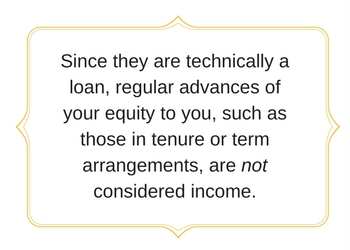 This is most likely to be an issue if you decide to take the one-time, lump-sum disbursement option. However, an HECM line of credit is generally not considered to be an asset for the purpose of means-tested benefits.
This is most likely to be an issue if you decide to take the one-time, lump-sum disbursement option. However, an HECM line of credit is generally not considered to be an asset for the purpose of means-tested benefits.
Since they are technically a loan, regular advances of your equity to you, such as those in a tenure or term arrangements, are not considered income.
Can I cancel my reverse mortgage?
Yes, with some restrictions.
As with most mortgages, you generally have a "three day right of rescission" when it comes being able to cancel your HECM. That is, up to three days after the loan has closed, you have a right to cancel the deal if you have second thoughts. If you exercise this right to cancel, all fees and charges must be returned to you within 20 days, according to the Federal Trade Commission.
However, in cases where the loan is an "HECM for Purchase" transaction, there is generally no three-day right to cancel.
Just as with a first mortgage, you can pay off your outstanding balance at any time and close out the loan.
Is it possible to pay off my HECM or reverse mortgage loan?
Although no payments are required, a homeowner can pay the loan off in full at any time with no prepayment penalty, or make a payment to lower the outstanding balance. If in conjunction with a line of credit, this can be useful to help preserve or increase available funds for future use.
What happens if I become incapacitated?
HECMs allow the borrower to be out of the home for a period of up to 12 months without affecting the loan, as long as another eligible resident lives in the home. However, if a borrower fails to occupy the property because of physical or mental illness and the property is not the principal residence of at least one other eligible resident, the loan becomes due and payable.
To qualify as a "principal residence," a borrower or eligible non-borrower must occupy the home for at least 183 days per year.
What happens if I move or live in my home part-time?
If you move, the reverse mortgage becomes due and payable.
Changing from full-time to part-time occupancy may be okay. As long as you haven't established another home as your principal residence, and continue to occupy your HECM-liened home for a majority of the year, there should be no effect on your ability to retain your HECM.
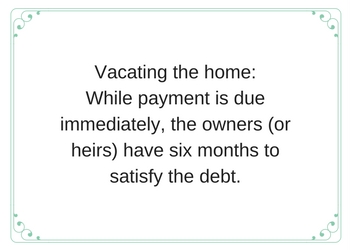 What happens when the home is vacated by the last eligible resident?
What happens when the home is vacated by the last eligible resident?
While payment is due immediately, the owners (or heirs) have six months to satisfy the debt. If they are selling the property and it is still on the market after six months, the sellers can contact their servicer and request a 90-day extension, subject to approval by HUD. One additional 90-day extension can be requested, again with HUD's approval. It is also possible to execute a "deed-in-lieu" transaction, where the title of the property is turned over to the lender.
What happens if I use all my equity?
Even if you should run out of equity, your HECM won't require you to make any payments.
In the case of a tenure payment, you technically never run out of equity; even if your loan balance exceeds the originally established principal limit, you will still receive your regular payment as scheduled. This will continue regardless of whether or not you have hit any principal limit.
That's unique only to tenure payments, though, and doesn't apply to other methods of accessing your funds. If your line of credit is fully tapped, even though you still won't be required to make payments, you will not be able to borrow any more money. You can still remain in the home, but the loan enters what is called a deferral period.
Once you get close to an underwater point, though, the ownership of your loan will likely change from the lender or servicer who has been managing it. Instead, the lender or servicer may assign the loan back to HUD, who will take over the obligation of making payments to you. Interest charges and any servicing fees will still accrue, but this is where the mortgage insurance you've been paying for will start to be drawn to cover those charges. The lender will assign the loan to HUD and receive all the monies they are due, and HUD's costs of managing your loan going forward are offset by drawing from the insurance pool to which you've been required to contribute.
It's technically possible that, if home prices have appreciated more strongly than anticipated over time, that you'll be able to refinance your HECM with a new HECM to allow you to tap these additional funds. However, this will generally require that you go back though the entire process again, paying closing costs and any mandatory fees an additional time. One small benefit might be that, depending upon the age of the existing HECM, you might not be required to attend counseling sessions a second time, and the up-front insurance premium may be reduced. For everything else, it will be akin to getting a brand-new HECM.
No equity left, but your obligations continue…
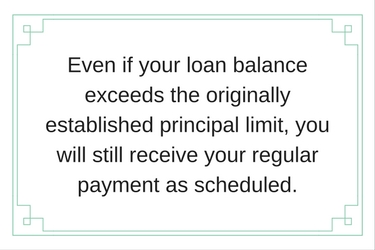 Although funds may have been set aside to cover them, your Life Expectancy Set-Aside (LESA) to cover property charges can run dry. If your LESA runs out, you will again become responsible for the payment of property charges and taxes. The lender is required to notify the borrower that the LESA has been exhausted and that they are again responsible for making future property charge payments.
Although funds may have been set aside to cover them, your Life Expectancy Set-Aside (LESA) to cover property charges can run dry. If your LESA runs out, you will again become responsible for the payment of property charges and taxes. The lender is required to notify the borrower that the LESA has been exhausted and that they are again responsible for making future property charge payments.
If the borrower fails to make the required payments, the lender has the authority from HUD to make payments. The lender is required to pull funds remaining in your account, if any. If your account has insufficient funds, the lender must pay required taxes and property charges with its own funds. At that time, the lender would contact you within 30 days to set up a plan to recover those funds.
Of course, failure to pay these required property charges does technically put the loan in default. If the borrower has insufficient funds available under the HECM to satisfy unpaid property charges, the borrower is in default and the mortgage is eligible to be called due and payable by the lender. If this situation isn't remedied by the borrower, this would generally start the loan down the path to foreclosure.
Can I end up owing any money to the reverse mortgage lender?
No. According to the HECM mortgage note, the borrower shall have no personal liability for payment of the debt secured by this mortgage; the lender may enforce the debt only through sale of the property. As a "non-recourse" loan, the lender is prohibited from obtaining any deficiency judgment against the homeowner if the loan if foreclosed.
In cases where this loan is returned to HUD -- for example, it reaches a threshold equivalent to 98 percent of the original established value, and the lender assigns it back to HUD -- the borrower has no liability for any difference between the total of the mortgage insurance benefits paid to the lender and the outstanding balance of the loan.
If the loan balance exceeds the home's appraised value, the FHA insurance fund absorbs that loss. The government pays for it with proceeds from its insurance fund, which the borrower pays into at closing and on a monthly basis.
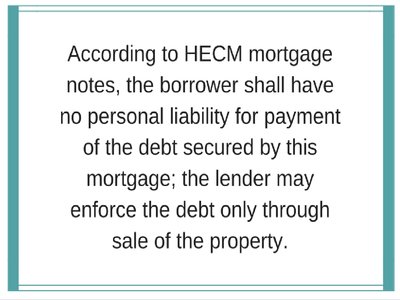 What annual certification do HECMs require?
What annual certification do HECMs require?
According to HUD's rules, an HECM borrower shall complete and provide to the servicer a certification on their present residency status every year. This certification verifies:
- The property remains the borrower's principal residence, and if applicable, is the principal residence of his or her eligible non-borrowing spouse.
- The presence of an eligible non-borrowing spouse.
- All requirements for the application of a loan deferral period apply and continue to be met.
If already in a loan deferral period, an eligible non-borrowing spouse must continue to file annual certifications that all conditions required to continue the loan deferral period are being met.
Previous: Reverse mortgage protections for spouses and other household occupants
For more answers, see:
RM / HECM Guide Section 1 Reverse Mortgage / HECM Basics
RM / HECM Guide Section 2 RM / HECMs and your finances
RM / HECM Guide Section 3 Reverse mortgage and your family




You got my attention when you said that it's possible to reverse mortgage loans by paying the loan off in full at any time. My husband said that he's interested to know if he can consider reversing his mortgage loans because he wanted a more secure financial status in his retirement days. We'll make sure to talk to a professional to get help in the process of reversing mortgage loans.